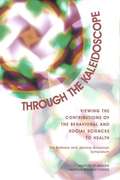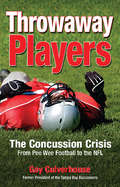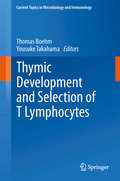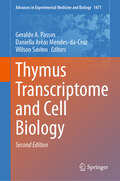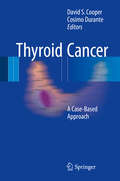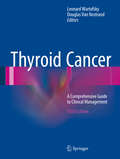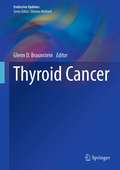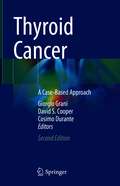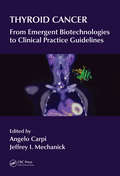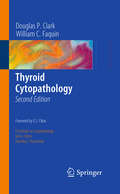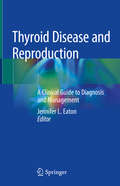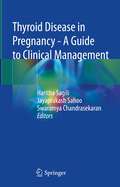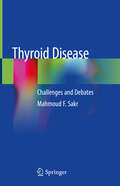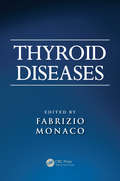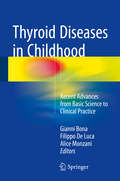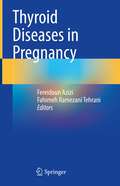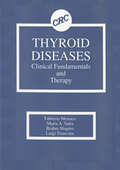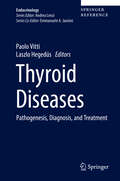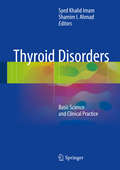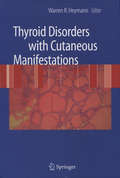- Table View
- List View
Through My Eyes: My Four Week Experience in Post-earthquake Haiti
by Debbie SalernoImagine that in eight short minutes your entire world comes crashing down upon you, literally. What would you do if you lost your home, your livelihood, your family, and your entire support network?
Through My Eyes: The Story of a Surgeon Who Took On the Medical World
by Charles D. Kelman"This book may ruffle feathers and bruise egos, but its fascinating tale adds a human quality to medical research." Dr. Frank Field Through My Eyes reads like a true adventure story. From the day his high school principal told him he wasn't college material and ought to go to trade school, Charles Kelman has upset conventional wisdom - with stunning success. As a pioneering ophthalmologist, Dr. Kelman bucked the whole medical establishment in his search for a less risky, less intrusive, and more effective method of cataract removal. Today, thanks to his persistence and smarts, thousands of people can see again. The "Rocky" of medicine, Dr. Kelman recounts his early struggles to achieve a breakthrough in surgical procedure-a battle Dr. Kelman had to wage in the face of intense skepticism from his colleagues. Through My Eyes tells the stories of the many famous people whose sight Dr. Kelman ultimately managed to save, including actress Hedy Lamarr, Senator Bob Packwood, jazz musician Lionel Hampton, singer Jan Peerce, and hundreds of others. But Charles Kelman also has a burgeoning second career- as a singer, saxophonist, and comedian. To his friends and fans he's known as "Dr. Jazz." And when he's not performing cataract surgery, he's performing at Carnegie Hall in New York, Caesar's Palace in Las Vegas, the Atlantis in Atlantic City, or on the "Tonight Show" with Johnny Carson. He has appeared on the stage with such performers as Glen Campbell, the Spinners, and Lionel Hampton. Through My Eyes shows how single-minded persistence and determination pay off. While this autobiography is bound to stir controversy in the medical world, Dr. Charles Kelman's story combines scientific savvy with personal style-showing how one adventurous man, all by himself, can make good, and make a difference. Charles D. Kelman, M.D., is a practicing ophthalmologist in New York City and the author of Cataracts: What You Must Know About Them. He is a clinical professor of Ophthalmology at New York Medical College. In addition to his regular medical duties, he is currently conducting research into macular degeneration of the retina, and-in his show business career-he is writing a musical for Broadway. Dr. Kelman lives in New York City.
Through The Kaleidoscope: Viewing The Contributions Of The Behavioral And Social Sciences To Health
by National Research Council Staff Institute of Medicine Staff Lisa F. Berkman Summary of the Institute of Medicine Symposium on Contributions of the Behavioral Social Sciences to Health StaffA report on Viewing The Contributions Of The Behavioral And Social Sciences To Health
Through the Glass Wall: A Therapist's Lifelong Journey to Reach the Children of Autism
by Howard ButenA remarkable testament of hope and love, these pages recount Howard Buten's lifelong journey working with autistic children. For three decades his pioneering, often controversial approaches have enabled him to gain access to their strange and solitary universe--a universe he shares in a book that is unlike any you've ever read. From his first unforgettable encounter with a wild, clawing human hurricane in the form of a little boy named Adam S., clinical psychologist Howard Buten has sought ways into the seemingly closed world of the autistic child. Whether he's done this by letting himself be pummeled, scratched, and bitten, or by imitating the child's behaviors, or by feeling himself into what the child must be feeling, he has often been rewarded. With extraordinary insight and in ways that are powerfully moving, he brings to life as never before the innermost selves of these children.Among those you'll meet in the clinic he founded in Paris are Lise, whose seemingly random movements are as expressive as a dancer's; Florian, who can instantly tell you on which day of the week your birthday falls for any year, past or future; Martin, whose nonstop speech echoes the angry voices he has heard all around him, but who is impervious to the emotions they contain; and Hakim, a child so lost and so violent, no other institution will take him.Writing with a scientist's clarity and a humanist's heart, Buten conveys the reality of autism with passion, ruthlessness, humor, wisdom--and love. This is a book both heartbreaking and hopeful, and when he succeeds in breaching the invisible wall of aloneness that seems to separate the autistic from the rest of us, we cheer.From the Hardcover edition.
Through the Seasons: Activities for Memory-Challenged Adults and Their Caregivers (A Johns Hopkins Press Health Book)
by Cynthia R. Green Joan BeloffA collection of easy-to-follow activities, organized by seasons of the year, to help family members and caregivers engage with memory-challenged adults.Dementia and related disorders impact the lives of those affected in countless ways, making it difficult to remain independent at work, at home, and in the wider world. But recent studies have shown that structured activities can make a significant, positive difference by stimulating mental engagement while improving interactions between caregivers and memory-challenged adults.Fun and easy to use, this large-format, full-color picture book is divided into themes representing the four seasons. Each section describes several multisensory experiences—such as walking on the beach, making ice cream, or planting flowers—along with related topics for discussion and activities to elicit memories and encourage new positive associations. The topics and activities incorporate all five senses to facilitate connections and conversations.The book adopts a compassionate, person-centered approach and is designed so that two people can easily look together while sitting side by side. This latest edition, which has been thoroughly revised, • takes a multicultural approach• includes all-new images, as well as 14 completely new highlighted activities • integrates modern wellness concepts• features a new introduction and an updated resource section• offers guidance about activity planning and optimizing interactions between care partners and the individual with dementiaHelping you and your loved one make cherished new memories, Through the Seasons is an indispensable solution to the question of what to do together to maintain well-being and connection.
Throwaway Players
by Gay CulverhouseThe NFL insists players know they're playing a dangerous game, but players never see the deteriorated mental capacities of their former heroes. Throwaway Players is former Tampa Bay Buccaneers president Gay Culverhouse's story of the broken bodies and lost souls of the men who have left the locker room and what remains after the cheering subsides. Focused on making money rather than the well-being of their players, this is the dark side of football the NFL doesn't want fans to see.Additionally, high schools, colleges, and independent sports organizations have little oversight when choosing player's equipment. This breeds a new generation of kids suffering from multiple concussions and damaged lives. Throwaway Players offers guidance to parents navigating the world of competitive sports as well as advocacy and resources for athletes often left in the dark about appropriate procedures for treating injuries, especially head traumas. Throwaway Players is essential reading for any parent, athlete, and sports fan.Gay Culverhouse testified before Congress on football head injuries and successfully changed the policy of including an independent neurologist on the sidelines of every NFL game. Gay's work with former players has appeared in The New York Times, Sarasota Herald Tribune, St. Petersburg Times, The Tampa Tribune, Time magazine, and many more. She has appeared on several radio shows, including PBS and ESPN, and is featured in three documentaries that are in post-production (with CNN, ESPN, and an independent filmmaker). In November 2009 Gay formed The Gay Culverhouse Players' Outreach Program, Inc., a nonprofit organization to further the work nationally for retired players.
Thuisloosheid bij jongeren en volwassenen (Werken in SPH)
by A.J. Ravelli M. Magnee B. Fontaine M.J. van Deutekom Marijke van BommelDit cahier gaat over jonge en volwassen thuislozen. De auteurs bespreken wie deze thuislozen zijn en hoe ze in die situatie zijn terechtgekomen. In de afgelopen decennia zijn allerlei voorzieningen voor thuislozen geïnitieerd. De huidige trend is om het gefragmentariseerde aanbod meer op elkaar af te stemmen en organisatorisch onder één noemer te brengen. Tegelijkertijd zijn er veranderingen aan de gang in de methodieken voor jongeren en volwassenen. Deze veranderingen zijn onder meer terug te vinden in de opleidingen voor hulpverleners en in de professionalisering van de zorg. Dit cahier biedt een beknopt overzicht van de stand van zaken.
Thymic Development and Selection of T Lymphocytes
by Thomas Boehm Yousuke TakahamaThe thymus is an evolutionarily ancient primary lymphoid organ common to all vertebrates in which T cell development takes place. Failing thymus function is associated with immunodeficiency and/or autoimmunity. In this volume, leading experts provide a comprehensive overview of recent advances in thymopoiesis research. The chapters cover the development of the thymic epithelial microenvironment, address the formation of a diverse and self-tolerant repertoire of T cell receptors as the basis for cellular immunity, discuss the mechanisms by which progenitor cells colonize the thymus and detail the molecular basis for T lineage decisions. The reviews illustrate the important role of the multifaceted process of thymopoiesis for adaptive immunity.
Thymus Transcriptome and Cell Biology (Advances in Experimental Medicine and Biology #1471)
by Geraldo A. Passos Daniella Arêas Mendes-da-Cruz Wilson SavinoThis volume focuses on a challenging field in biomedicine: the genetic control of central immune tolerance. The thymus gland is a lymphoid organ implicated in T cells' maturation, differentiation, and selection. Its function is associated with the control of immune homeostasis in the body, establishing central immune tolerance, and preventing the onset of autoimmune diseases. This book focuses on thymus development, their cellular components and their respective function, and the peculiar gene expression profiling (transcriptome) found in the medullary thymic epithelial cells (mTECs) that are implicated in the self-representation in the thymus and the Autoimmune regulator (Aire) gene. Chapters also explore the mutations in the Aire gene, manifestation of autoimmune diseases, and the role of cell-cell interactions within the thymus with implications in the negative selection (elimination) of nascent autoreactive T cells in preventing aggressive autoimmunity. This new edition includes two new chapters devoted to the genome editing of the Aire gene through Crispr-Cas9 system, and thymic involution.All chapters have been updated to reflect the latest research in the field.
Thyroid Cancer
by David S. Cooper Cosimo DuranteComprised exclusively of clinical cases covering the diagnosis and treatment of thyroid cancer and related clinical issues, this concise, practical casebook will provide clinicians in endocrinology and oncology with the best real-world strategies to properly manage the various forms of thyroid cancer that they may encounter. Each chapter is a case report, written by recognized experts, that opens with a unique clinical presentation, followed by a description of the diagnosis, assessment and therapy, as well as the case outcome, literature review, clinical pearls and pitfalls, and bibliography. All recommendations are based on evidence-based clinical practice guidelines and recent literature. Cases included illustrate treatment for both low and high risk differentiated thyroid cancer, including surgical approaches, radioiodine therapy, and novel chemotherapies and targeted therapies, as well as postoperative follow-up and special issues. Additional cases demonstrate the management of medullary thyroid cancer, thyroid lymphoma and anaplastic thyroid cancer. Pragmatic and reader-friendly, Thyroid Cancer: A Case-Based Approach will be an excellent resource for clinical endocrinologists and oncologists, endocrine fellows, residents and students alike.
Thyroid Cancer
by Leonard Wartofsky Douglas Van NostrandThoroughly revised and extensively expanded, this encyclopedic, highly acclaimed title addresses all aspects of the etiology, pathogenesis, diagnosis, initial treatment and long-term management of all varieties of thyroid cancer. Expertly edited by Drs. Leonard Wartofsky and Douglas Van Nostrand, this gold standard reference is divided into 11 Parts: General Considerations on Thyroid Cancer; General Considerations on Nuclear Medici≠ the Thyroid Nodu≤ Well-Differentiated Thyroid Cancer; Variants of Thyroid Cancer, Undifferentiated Tumors: Medullary Thyroid Carcinoma; Undifferentiated Tumors: Thyroid Lymphoma; Undifferentiated Tumors: Anaplastic Thyroid Cancer; New Frontiers and Future Directions; and Additional Resources. With exceptional breadth and depth, the book includes chapters dedicated to isotopes, isotope uptake and scanning procedures such as SPECT/CT, radioiodine ablation (with or without recombinant human TSH), stunning, dosimetry (with or without recombinant human TSH), Octreotide and FDG-PET scanning and other alternative imaging modalities. There is a valuable reference atlas of scan images and illustrations, and a scholarly summary of the side effects of radioiodine and how to avoid or minimize adverse effects of treatment. In addition to an updated section on ultrasonography of the thyroid gland, new sections have been added, including ones on ultrasonography of cervical lymph nodes and imaging for thyroid cancer employing computerized tomography (CT), positron emission tomography (PET) and magnetic resonance imaging (MRI). An indispensable reference source with chapters written by the field's leading authoritative experts, Thyroid Cancer: A Comprehensive Guide to Clinical Management, Third Edition, will be of great interest to not only pathologists, endocrine surgeons, endocrinologists, nuclear medicine physicians, and oncologists but all clinicians with an interest in thyroid cancer.
Thyroid Cancer
by Glenn D. BraunsteinThe American Cancer Society recently estimated that about 45,000 new cases of thyroid cancer will be diagnosed in the United States, with three-quarters occurring in women. The overall 5-year survival rate is about 97%, making it one of the least lethal cancers. We are experiencing an epidemic of well-differentiated thyroid cancer, in part due to the widespread use of imaging modalities that detect thyroid nodules and microcarcinomas. Concurrently, there have been a number of recent advances in surgical treatment, as well as diagnostic modalities that allow us to detect small amounts of residual local and metastatic disease. Additionally, a reexamination of past treatment regimens has led to new recommendations regarding the use of radioactive iodine, and to new therapeutic options, such as targeted therapy which have supplanted the use of more toxic chemotherapy for metastatic cancer. Multiple academic organizations have developed consensus guidelines for the management of thyroid cancer, occasionally with conflicting recommendations. In Thyroid Cancer, a renowned group of authors presents a broad overview of the pathology, pathophysiology, diagnosis, and management of thyroid cancer, with an emphasis on recent evidence-based information. State-of-the-art and a significant contribution to the literature, Thyroid Cancer is an invaluable reference for endocrinologists, oncologists, nuclear medicine physicians, radiation oncologists, primary care physicians, and surgeons who deal with head and neck cancer.
Thyroid Cancer: A Case-Based Approach
by David S. Cooper Cosimo Durante Giorgio GraniNow in its second edition utilizing brand new clinical case material, this popular, user-friendly text presents the diagnosis and treatment of thyroid cancer and related clinical issues, providing clinicians in endocrinology and oncology with the best real-world strategies to properly manage the various manifestations of thyroid cancer that they may encounter. Each chapter is a case report that opens with a unique clinical presentation, followed by a description of the diagnosis, assessment and therapy, as well as the case outcome, literature review, clinical pearls and pitfalls, and bibliography. All recommendations are based on evidence-based clinical practice guidelines and recent literature. Written by experts in the field, these cases illustrate treatment for both low- and high-risk differentiated thyroid cancer, including surgical approaches, radioiodine therapy, and novel chemotherapies and targeted therapies, as well as postoperative follow-up and special issues. Additional cases demonstrate the management of medullary thyroid cancer and anaplastic thyroid cancer. Topics new to the second edition include information on management of small thyroid cancers with “active surveillance” (without surgery), new chemotherapeutic approaches to advanced thyroid cancer, and new information on a lesion that is no longer considered to be thyroid cancer (Neoplastic Follicular Thyroid Neoplasm with Papillary-Like Features [NIFTP]), as well as material on external beam radiotherapy and new approaches to the management of anaplastic thyroid cancer.Pragmatic and reader-friendly, this second edition of Thyroid Cancer: A Case-Based Approach will be an excellent resource for clinical endocrinologists and oncologists, endocrine fellows, residents and students alike.
Thyroid Cancer: From Emergent Biotechnologies to Clinical Practice Guidelines
by Jeffrey I. Mechanick Angelo CarpiThe current age of clinical medicine is witnessing biotechnological innovation at an unprecedented pace. As a result, the recently popularized clinical practice guidelines (CPG), as a tool to assist clinical decision-making, have been struggling to keep up. Thyroid Cancer: From Emergent Biotechnology to Clinical Practice Guidelines rides the wave o
Thyroid Cytopathology
by William C. Faquin Douglas P. ClarkEighth volume to be published in the Essentials in Cytopathology book series. More than 115 full-color images, 12 tables and a series of algorithms. Designed to be concise and easy to use. Fits in lab coat pocket. Site specific. Illustration oriented accompanied by text in outline format. A must-have for every pathologist, cytopathologist, cytotechnologist, fellow and trainee.
Thyroid Disease and Reproduction: A Clinical Guide To Diagnosis And Management
by Jennifer L. EatonThis book is a practical, evidence-based resource covering thyroid disease and its effects on reproduction and fertility, discussing thyroid function and dysfunction - hypothyroidism and hyperthyroidism, thyroid nodules and cancer - during pregnancy as well as its effects on the fetus. It begins with a review of the anatomy and function of the thyroid and the biosynthesis and physiology of thyroid hormones, as well as the pathophysiology of thyroid dysfunction. The chapters that follow discuss thyroid function and dysfunction (e.g., hypothyroidism and hyperthyroidism) during pregnancy and its effects on fertility as well as the developing fetus. The management of thyroid nodules and cancer, the role of thyroid dysfunction in infertility, the role of thyroid autoimmunity and miscarriage, and postpartum thyroiditis are presented in detail in the concluding chapters. Clinical cases and outcomes bookend each chapter, demonstrating current management strategies for a well-rounded presentation.Filling a clear gap in the literature usually covered only briefly in larger texts on the thyroid, Thyroid Disease and Reproduction: A Clinical Guide to Diagnosis and Management is a unique resource for reproductive endocrinologists, obstetrician/gynecologists, and residents and students in these clinical areas.
Thyroid Disease in Pregnancy - A Guide to Clinical Management
by Haritha Sagili Jayaprakash Sahoo Swaramya ChandrasekaranThis book focuses on all aspects of thyroid disease in women during pregnancy, preconception and the postpartum period. Exceptional emphasis is provided on screening for thyroid dysfunction before and during pregnancy and interpretation of thyroid function tests in pregnancy. The chapters cover the topics on the role of Iodine, thyroid autoantibodies, hypothyroidism , thyrotoxicosis and thyroid nodules / cancer in pregnant women and postpartum thyroiditis with helpful illustrations and clear flow charts. This book serves as a resourceful guide for clinicians and medical practitioners in managing thyroid disease and related complications in women at different stages of pregnancy.
Thyroid Disease: Challenges and Debates
by Mahmoud F. SakrThis volume presents and analyses the ongoing arguments, controversies, challenges and debates on thyroid disease with a view to clarifying some uncertainties, and to making suggestions that will help resolve others.Issues such as thyroid disease during pregnancy, Hashimoto’s disease, Hurthle cell lesions, solitary thyroid nodules, retrosternal goiter, thyroid cancer, recurrent thyroid disease, thyroidectomy techniques, post-thyroidectomy hypocalcemia, and thyroid auto-transplantation are thoroughly explored. Richly illustrated, the book offers an invaluable tool for all specialists and trainees entrusted with the care of patients suffering from thyroid disease.
Thyroid Diseases
by Fabrizio MonacoIn recent years, the clinical evolution of thyroid diseases has been studied exhaustively as new discoveries have been made about thyroid malfunction and the effective management of patients. Thyroid Diseases presents a comprehensive exposition of a range of disorders caused by thyroid dysfunction. With contributions by well-known experts in the fi
Thyroid Diseases in Childhood
by Gianni Bona Filippo Luca Alice MonzaniThis book covers the entire spectrum of thyroid diseases in childhood, focusing on the recent advances that have been achieved, from progress in basic science research through to novel or improved approaches to diagnosis and treatment. Introductory chapters discuss thyroid embryogenesis and the role of thyroid hormones in fetal development. The two contrasting forms of thyroid dysfunction, hypo- and hyperthyroidism, are then considered in depth, with particular attention to the molecular causes of congenital hypothyroidism. Among the other topics addressed are autoimmune thyroiditis, thyroid nodules, and pediatric neoplasms. The book concludes with an overview of promising therapeutic approaches, such as stem cell therapy. Each topic is treated by an eminent expert in the field, ensuring consistently high quality. Thyroid Diseases in Childhood will be an important source of information for endocrinologists, pediatricians, oncologists, and gynecologists, as well as other professionals interested in this topic.
Thyroid Diseases in Pregnancy
by Fereidoun Azizi Fahimeh Ramezani TehraniThis book provides a comprehensive overview of various thyroid disorders in pregnancy. Merging clinical evidence with their own professional experience, international experts in the field report on novel research and share insights on a broad range of topics, from addressing the normal physiology of the thyroid in pregnancy, to the safe treatment of disorders during pregnancy. Given its scope, the book is chiefly intended for internists, obstetricians, gynecologists, endocrinologists and related sub-specialists; however, it will also benefit general physicians.
Thyroid Diseases: Clinical Fundamentals and Therapy
by Fabrizio Monaco Brahm Shapiro Maria A. Satta Luigi TronconeThyroid Diseases: Clinical Fundamentals and Therapy provides a wide-ranging examination of all clinically significant areas of thyroid diseases. Underlying physiological principles are closely linked to the clinical situation and practical therapeutic interventions. The book examines the clinical course, therapy, and final outcome of thyroid diseases, particularly the bimodal and transient evolution of several thyroid diseases. It also discusses the medical, surgical, and radiometabolic therapy of thyroid diseases, stressing the pros and cons of each therapeutic modality. More than 80 acknowledged experts from North America, Europe, and Japan have contributed to this exceptional reference volume, making it essential for physiologists, clinical endocrinologists, radiologists, researchers in nuclear medicine, oncologists, and radiotherapists.
Thyroid Diseases: Pathogenesis, Diagnosis, And Treatment (Endocrinology Ser.)
by Paolo Vitti Laszlo HegedüsThis book presents the latest advances in knowledge of the pathogenesis of thyroid diseases and describes the state of the art in their diagnosis and treatment, including newly emerging management approaches. After an opening section that addresses thyroid physiology and laboratory evaluation, each of the major thyroid diseases and their subtypes is discussed, covering goiter and thyroid nodule, thyroiditis, hypothyroidism, hyperthyroidism and thyrotoxicosis, and thyroid carcinoma. Other conditions that affect thyroid function or induce thyroid dysfunction are also considered, e.g., pregnancy, non-thyroidal disorders, and medication use. The book is designed to assist practitioners to achieve optimal outcomes in clinical routine by providing clear guidance on clinical examination, the use of diagnostic tests, first- and second-line therapies, and follow-up. Chapter have been written by recognized experts in the field.
Thyroid Disorders
by Shamim I. Ahmad Syed Khalid ImamThis book provides comprehensive knowledge about thyroid gland and highlights the recent trends in the management of thyroid dysfunctions. Thyroid disorders are amongst the most prevalent of medical conditions possibly after diabetes. The prevalence of thyroid dysfunction in adults in the general population ranges from 1 to 10 percent, and is even higher in selected groups. In the United Kingdom, 1-2% of the adult population is found to have thyroid dysfunction. It is interesting to note that thyroxin is the sixth most commonly dispensed drug in Scotland. Virtually all studies report higher prevalence rates for hypothyroidism in women and with advancing age. Abnormal thyroid functions have important public health consequences. Suppressed TSH levels have been associated with decreased bone density and with an increased risk of atrial fibrillation and premature atrial beat. It has been known for decades that overt hypothyroidism contributes to elevated serum cholesterol levels and cardiovascular risk and recent studies suggest this may also be true with subclinical hypothyroidism.
Thyroid Disorders with Cutaneous Manifestations
by Warren R. HeymannThe spectrum of the cutaneous manifestations of thyroid disease includes cutaneous metastases from thyroid malignancies and thryoglossal duct cysts, nonspecific alterations of the skin, hair, and nails reflecting both the hyperthyroid and hypothyroid states, and the multiple associations of thyroid disease with other cutaneous and systemic diseases. Internists, family practitioners, pediatricians, geriatricians, and dermatologists address these issues on a daily basis: When is it appropriate to evaluate a patient for thyroid disease? How should the patients be evaluated? How often should testing be performed? Should other family members be screened for thyroid disease? The purpose of The Thyroid in Dermatology is to raise awareness of the vast spectrum of thyroid-skin interactions, and to provide a framework for the appropriate diagnosis and management of these diseases.


